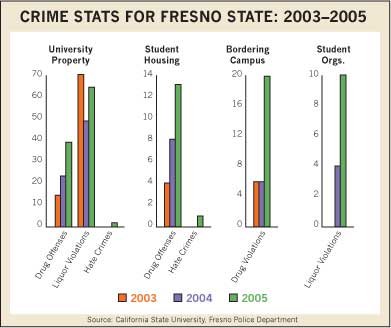Fresno State crime stats fluctuate
By Jeff Christian
The Collegian
The 2005 campus crime statistics have revealed a significant increase in the number of arrests due to liquor law violations and drug offenses.
Fresno State Dean of Student Affairs, Robert Hernandez, believes that the increase in liquor and drug violations last year wasn’t due to an increase in use, but was instead attributed to the ABC Grant, a state grant that provided for extra alcohol law enforcement on and off-campus.
“There were more officers looking for alcohol related misconduct due to problems in previous years. They were able to intercede in a lot more instances with people than they had in the past,” Hernandez said.
According to Campus Police Chief David Huerta, the campus police department didn’t make any significant changes in 2005 to on alcohol and drug violations.

Graphic by Angela Lorona / The Collegian |
“We happen upon it more than we actually target looking for people. It’s not like we drive around looking to see who is drinking. We target areas based on crime activity or behavior problems and if we come across those offenses then we take the appropriate action,” Huerta said.
There were a total of 123 liquor law violation arrests last year, an increase of 26. The violations cover university property on campus, student housing, student organizations off-campus and the neighboring public property bordering campus.
Hernandez said he believes the most common alcohol arrests for Fresno State students are for minors in possession and public intoxication.
Another striking element in the crime statistics, which are required to be released under the Jeane Cleary Disclosure of Campus Security Policy and Campus Crime Statistics Act, was the occurrence of hate crimes on campus. In 2005, there were three total anti-race crimes reported. Two instances actually occurred on campus: one involved an act of vandalism while the other involved a racial threat or offensive language. The third anti-race crime reported was an act of vandalism in student housing.
Although there were no reported hate crimes in 2003 or 2004, Huerta believes that the three incidents that occurred last year don’t signal an increased trend.
“I believe that at this point in time, most of these incidents are just isolated incidents that occur. We’ve seen no trend here,” Huerta said.
The campus police are consisted of 17 sworn police officers, 14 of which are actually patrolling the street. Although the staff is spread thin, the department also uses other crime prevention methodologies, such as video surveillance technology, to cover the entire campus.
Auto theft was one area of significant improvement last year. Auto theft on campus hit its lowest mark in the past three years with only 18 incidents reported on campus or in student housing. In 2004 there were 31 reported auto thefts, which was a decrease from the previous year when the number had ballooned to 47.
“It’s not just a police thing when there is crime. It’s everybody’s problem and everyone has to get involved. We continually try to tell people on campus not to leave things in their car that people can look in and see because they are going to break a window and take it,” Huerta said.
According to Huerta, the decrease in auto theft stems primarily from a coordinated prevention effort throughout the city and the state to decrease the number of incidents and create harsher sentencing for those arrested.
“I worry about having my car broken into, but it hasn’t happened yet,” freshman dorm resident Chris Lavallee said.
Huerta believes ultimately it is the students themselves who can make the campus a safer environment.
“A lot of people are reluctant to think that somebody is suspicious because people usually tend to think that if you’re on a college campus you belong here. People should adopt a philosophy that this campus is their campus. The individuals here should identify with it as being their personal campus and they should protect it as if they owned it,” Huerta said.
Freshman dorm resident Michelle Streiff thinks that the campus is a safe environment but that there are areas that could be improved.
“It’s pretty dark at night, especially near the dorm parking lot and the library. Adding more lights might make things safer,” Streiff said.
Streiff said she does take certain precautions to ensure her safety.
“I always make sure that the door in the dorms shuts behind me. I don’t let it shut on its own,” Streiff said.
Huerta believes that overall the campus is a safe place and although crimes happen, the key for the campus police department is to analyze the problem and improve any vulnerabilities for the future.
“We’re always going to have things that spike. Tomorrow we could have gang members decide to hit Lot G for 20 cars, but that’s just a spike and they might not come back for a year,” Huerta said. “Those are the kinds of things you can’t predict.”
Comment on this story in the News forum >>
|

